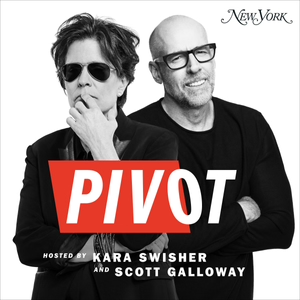
How Bitcoin Is Becoming a Lifeline for Cubans
03/01/21 • 24 min
This week on Borderless, tech reporter Leigh Cuen speaks with data analyst and entrepreneur Boaz Sobrado about how bitcoin became relevant to him when he had to use it at his e-commerce company.
With the changes in the U.S. presidential administration in 2016 and the strict regulations that followed it became harder to bank in Cuba. Processing payments and conducting proper international transactions were causing his company to bleed money. So Boaz turned to bitcoin to move money in and out of the country safely and provide commerce to Cuban communities.
However, bitcoin adoption in Cuba turned out to be harder than he thought. Due to COVID-19, Cuba is undergoing the worst economic crisis since the 1990s. At that time Cuba’s economic structure was so atrocious that portions of its population suffered from hunger. Boaz says, “We aren’t there yet” that it isn’t as bad as the crisis of the 1990s. However, with Western Union remittance rates going down there is less and less money in the country. This has caused inflation to rise and product delivery to the country of Cuba to become more difficult.
Listen as Sobrado discusses the informal peer-to-peer development of the cryptocurrency markets in Cuba and how the internet penetration in Cuba is accelerating bitcoin adoption.
Did you enjoy the show? We would love to hear what you think. Leave us a review on Apple Podcasts or your preferred service and talk to us directly via email at [email protected].
See Privacy Policy at https://art19.com/privacy and California Privacy Notice at https://art19.com/privacy#do-not-sell-my-info.
This week on Borderless, tech reporter Leigh Cuen speaks with data analyst and entrepreneur Boaz Sobrado about how bitcoin became relevant to him when he had to use it at his e-commerce company.
With the changes in the U.S. presidential administration in 2016 and the strict regulations that followed it became harder to bank in Cuba. Processing payments and conducting proper international transactions were causing his company to bleed money. So Boaz turned to bitcoin to move money in and out of the country safely and provide commerce to Cuban communities.
However, bitcoin adoption in Cuba turned out to be harder than he thought. Due to COVID-19, Cuba is undergoing the worst economic crisis since the 1990s. At that time Cuba’s economic structure was so atrocious that portions of its population suffered from hunger. Boaz says, “We aren’t there yet” that it isn’t as bad as the crisis of the 1990s. However, with Western Union remittance rates going down there is less and less money in the country. This has caused inflation to rise and product delivery to the country of Cuba to become more difficult.
Listen as Sobrado discusses the informal peer-to-peer development of the cryptocurrency markets in Cuba and how the internet penetration in Cuba is accelerating bitcoin adoption.
Did you enjoy the show? We would love to hear what you think. Leave us a review on Apple Podcasts or your preferred service and talk to us directly via email at [email protected].
See Privacy Policy at https://art19.com/privacy and California Privacy Notice at https://art19.com/privacy#do-not-sell-my-info.
Previous Episode

Crypto Taxes Are Coming So What Is Next?
In this episode, Anna Baydakova and Danny Nelson discuss the coming crypto taxation in Russia and India, North Korean hackers indicted by the U.S. Department of Justice and the GameStop story rolling into the U.S. Congress.
Russia is on its way to taxing cryptocurrency transactions. A draft bill on crypto taxation is now in Russia’s parliament, the State Duma, and it has just passed its first round of hearings last week. The bill says Russian taxpayers must declare crypto they receive to their wallets if its overall value reaches 600,000 rubles, or a bit more than US$8,000.
India is also moving towards crypto taxation. According to a new draft bill, the government is likely to impose a personal income tax on crypto traders and a goods and services tax on trading platforms. So crypto exchanges will have to pay 18 % from the trading fees they earn.
Around the world, it’s becoming our new reality: you deal with crypto, you tell your government about it. Danny shares personal experiences while Anna shares some fears about the future.
This week, the U.S. Department of Justice went after three North Korean hackers for allegedly stealing over $100 million in cryptocurrency from exchanges, including a handful in the U.S. Prosecutors said North Koreans have become the “world’s leading bank robbers,” using keyboards as weapons instead of guns. As longtime listeners of the pod know, they’re using that crypto to build more sinister weapons: nukes!
They even used an initial coin offering to raise money! (Not financial advice.)
GameStop goes to Congress: the U.S. lawmakers questioned Reddit and Robinhood CEOs, as well as the redditor Roaring Kitty. Hearings like this might become hits on their own, just as the Facebook hearings did a couple years ago. But should we expect any material changes afterwards? One thing is for sure: Traditional capital markets are aping right into the crypto world insanity.
Did you enjoy the show? We would love to hear what you think. Leave us a review on Apple Podcasts or your preferred service and talk to us directly via email at [email protected].
See Privacy Policy at https://art19.com/privacy and California Privacy Notice at https://art19.com/privacy#do-not-sell-my-info.
Next Episode

Why Bitcoin Is a Safe Haven and Weapon, Feat. Alex Gladstein
This week on “Borderless,” Anna Baydakova and Danny Nelson speak with Alex Gladstein, chief strategy officer for the Human Rights Foundation, about the intersection of bitcoin and activism, how global movements are using blockchain and what governments might try to do to stop it.
As more world governments step up their digital and financial surveillance measures, bitcoin has become a safe haven for pockets of oppressed. For example, in Nigeria female activists now harness bitcoin to get around government-ordered banking blockades. Alex and his partners at Human Rights Foundation use crypto grants and vocal advocacy to spotlight their stories.
At the same time, some governments have begun treating bitcoin as a tool of their own. The hosts discuss with Alex the ramifications of bitcoin weaponization and consider whether the problem is as bad as the United Nations makes it out to be. Does North Korea really fund its nuclear weapons program with stolen crypto? Alex has a lot to say.
Later in the episode, the hosts take on the non-fungible token (NFT) craze that’s taking the digital collectibles world by storm. What makes a LeBron James video worth hundreds of thousands of dollars, anyway?
Did you enjoy the show? We would love to hear what you think. Leave us a review on Apple Podcasts or your preferred service and talk to us directly via email at [email protected].
See Privacy Policy at https://art19.com/privacy and California Privacy Notice at https://art19.com/privacy#do-not-sell-my-info.
If you like this episode you’ll love
Episode Comments
Generate a badge
Get a badge for your website that links back to this episode
<a href="https://goodpods.com/podcasts/borderless-481562/how-bitcoin-is-becoming-a-lifeline-for-cubans-64414060"> <img src="https://storage.googleapis.com/goodpods-images-bucket/badges/generic-badge-1.svg" alt="listen to how bitcoin is becoming a lifeline for cubans on goodpods" style="width: 225px" /> </a>
Copy




